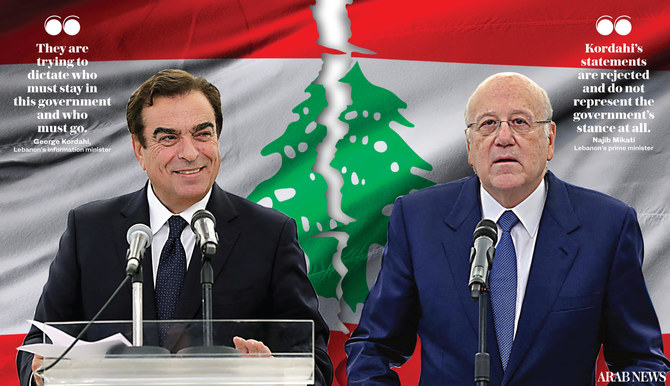When Lebanese Prime Minister Najib Mikati formed a government in September, ending a 13-month-long political stalemate, a collective sigh of relief was heard across the land. But the writing was already on the wall.
It did not take long for the moment of truth to arrive. Yet it was not the economic meltdown, the electricity crisis, the Beirut blast inquiry deadlock or the unfolding humanitarian disaster in the country that laid bare the Mikati government’s impotence, it was something entirely different.
A TV star-turned-information minister was found to harbor outrageous views on an issue only peripherally related to Lebanon’s problems, but which had the potential to precipitate a serious diplomatic crisis for the country.
In an interview that came to light recently, George Kordahi claimed that the Iran-backed Houthi militia in Yemen was defending itself and that the war in Yemen should stop.
Although the interview was recorded before he assumed his cabinet post, Kordahi’s views came as a rude shock to Lebanon’s Gulf-Arab friends, who have been on the receiving end of another harmful campaign originating in Lebanon.
For the past six years, there have been continual attempts to smuggle weapons from Lebanon to the Houthis, and narcotic pills, mainly Captagon, from Lebanon to Saudi Arabia and other Gulf countries.
As Waleed Bukhari, Saudi Arabia’s ambassador to Lebanon, said in a tweet this year: “The quantity of drugs and psychotropics smuggled from Lebanon is enough to drown not only Saudi Arabia but also the entire Arab world.”
Against this backdrop, Lebanese leaders are naturally facing pressure to remove Kordahi from his post as a first step toward mending relations with the Gulf countries.
Lebanese officials also have been urging their American and French counterparts to mediate in the dispute sparked by Kordahi’s comments. The Foreign Ministry said on Sunday that Lebanon’s “great concern (is) to have the best relations with its Gulf and Arab brothers.”
But all the indications are that the situation will get worse before it gets better.
Kordahi has said that he does not intend to quit his post. In a televised speech on Sunday he stated bluntly: “Resigning from the government is not an option.”
Meanwhile, Saudi Arabia, the UAE, Kuwait and Bahrain recalled their ambassadors from Beirut and ordered their respective Lebanese ambassadors to leave. The UAE has banned its citizens from traveling to Lebanon.
Prince Faisal bin Farhan, the Saudi foreign minister, has made it clear that Kordahi’s statements are a symptom of the root of the problems affecting Lebanon: The influence of Hezbollah, which has been the de-facto ruler of Lebanon for a very long time.
Seasoned observers of Lebanese politics view Kordahi as an irrelevance at best. They point out that he has a track record of reading someone else’s script: First from a teleprompter as the host of the Arabic version of the quiz show “Who Wants to Be a Millionaire?” and now from scripts handed to him by Hezbollah, as described by Arab News Editor in Chief Faisal J. Abbas in a recent column.
What has come as a rude awakening for Lebanon’s friends and well-wishers is not so much Kordahi’s ill-informed views about the war in Yemen, as the feeble response to them from Mikati’s government.
“Compared with the average Lebanese prime minister, Mikati is less confrontational and more consensus-driven,” Chris Abi-Nassif, the Lebanon program director at the Middle East Institute, told Arab News. “Last week’s diplomatic escalation caught him by surprise, especially given that he was banking on his relatively good ties with the Gulf to start reversing Lebanon’s downward trajectory.
“The escalation, however, shows that he clearly has very little maneuvering space and political capital today to stand up against Hezbollah or appease (let alone engage) the Gulf states, which explains the indecision in Beirut over the past few days.”
Mikati, who is currently in Glasgow, Scotland, for COP26, the UN Climate Change Conference, was due to hold “several international and Arab meetings on Monday and Tuesday to discuss the current crisis between Lebanon and Gulf countries” on the sidelines of the event.
Precisely what conciliatory steps he is contemplating are far from clear, even though Fawzi Kabbara, Lebanon’s ambassador to Saudi Arabia, said upon his return to Beirut that “restoring Lebanese-Saudi ties would be possible if Lebanon agrees to the conditions.”
Many Lebanese people think any other leader would have sent Kordahi packing, and accuse Mikati of failing to show strong leadership given that the minister’s views contradict Lebanon’s official position on the Yemen conflict.
They add that it is obvious from the controversy that Kordahi’s protectors are Hezbollah and its ally, the Marada Movement leader Suleiman Frangieh, who have pointedly praised him and are ensuring that he remains in his job

